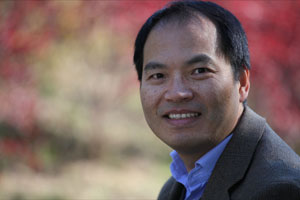| |
Program
|
9:30 - 10:00 |
Registration & Opening
|
|
10:00 - 11:00 |
Emotionally Intelligent Machines and the Future of Robotics (Prof. Zhengyou Zhang)
|
|
|
Abstract: Human-Computer Interaction has been evolved from punch card, through the mainstream mouse, keyboard and touch input, to more recent natural user interaction (NUI) with voice and gesture. I believe we are at the crust of next generation
of human-computer interaction which is emotionally intelligent. With high-definition cameras and noise-cancelling microphones, together with better algorithms and larger labeled data, the computer can increasingly understand human’s emotion better and better,
toward seamless human-computer interaction. By looking at people’s facial expression and hearing their voice tone, the computer can determine whether
they are stressed or happy or interested or sleepy. Many applications are possible, ranging from education, medical treatments, advertisement, and entertainment, to security screenings. A robotic assistant (physical or virtual) obviously needs
to understand its user’s emotion states. In this talk, I will describe our work on emotion and virtual assistant. I will also describe the vision and roadmap of Tencent Robotics X, a recently established lab at Tencent for advanced research and development
in robotics.
|
|
|
Bio: 张正友,博士,ACM Fellow(国际计算机学会院士)和 IEEE Fellow(国际电气电子工程师学会院士),
目前任腾迅机器人实验室(Robotics X)主任,Robotics X和AI Lab是腾讯AI产业的双基础支撑部门。
张正友博士是前美国微软公司合伙人,微软研究院首席研究员和研究经理,1998年3月加入微软美国本部二十年。
张正友于1985毕业于浙江大学获得学士学位,1987年获得法国南锡大学硕士学位,1990年获得巴黎第十一大学博士学位,
在法国国家计算机和自动化研究院(INRIA)学习工作近十二年,参与了多项欧洲及法国的计算机视觉和机器人重大项目。
1997年在日本先进技术研究院(ATR)学术休假一年,在世界上第一个用神经网络研究人脸表情识别。
张正友博士是世界著名的计算机视觉和多媒体技术的专家,在立体视觉、三维重建、运动分析、图像配准、
摄像机自标定、人脸表情识别,机器人导航,语音增强与识别,沉浸式远程交互,视频会议系统等方面都有开创性的贡献。
发表论文250余篇,Google Scholar论文引用次数近44000,单篇最高引用次数超过11000次。拥有近200项专利,他发明的平板
摄像机标定法在全世界被普遍采用,被称之为“张氏方法”。张正友带领的微软研究院视觉团队在学术研究上做了大量的工作,
除在国顶顶尖会议(比如CVPR、ICCV、Siggraph,ACM Multimedia)上发表了大量文章和几部专著,而且在微软很多产品里都
有团队的贡献,比如Windows、Office、Xbox、Kinect、Skype for Business、Office Lens等。张正友是国际顶级会议CVPR 2017大会
共主席,担任多个国际顶级期刊主编副编委和国际著名会议大会主席和程序委员会主席。
|
|
|

|
|
11:00 - 12:00 |
Simulation and Navigation for Autonomous Vehicles in Dense Scenarios (Prof. Dinesh Manocha)
|
|
|
Abstract: In this talk, we give an overview of our recent work on simulation and navigation technologies for autonomous vehicles. Recently, there is
considerable interest in developing simulator or virtual world for set-driving vehicles. We present AutonoVi-Sim, a novel high-fidelity
simulation platform for testing autonomous driving algorithms. AutonoVi-Sim is a collection of high-level extensible modules which allows
for the rapid development and testing of vehicle configurations, and facilitates construction of complex road networks. Autonovi-Sim
supports multiple vehicles with unique steering or acceleration limits taking into account vehicle dynamics constraints. In addition,
AutonoVi-Sim supports navigation for non-vehicle traffic participants such as cyclists and pedestrians AutonoVi-Sim also facilitates data analysis,
allowing for capturing video from the vehicle’s perspective, exporting sensor data such as relative positions of other traffic participants,
camera data for a specific sensor, and detection and classification results. We highlight its performance in traffic and driving scenarios.
We also describe new algorithms for planning and navigation in dense road conditions. Our approach takes into account the shapes and dynamics
of road entities like cars, pedestrians, bicycles, trucks and use them to design local navigation methods. We also infer driver behavior’s from
the vehicle trajectories and use them to design safe navigation strategies.
|
|
|
Bio: Dinesh Manocha is currently the Phi Delta Theta/Mason Distinguished Professor of Computer Science at the University of North
Carolina at Chapel Hill. In Fall’2018, he will join University of Maryland at College Park. He received his Ph.D. in Computer
Science at the University of California at Berkeley 1992. He has published more than 480 papers and some of the software systems
related to collision detection, GPU-based algorithms and geometric computing developed by his group have been downloaded by more t
han 200,000 users and are widely used in the industry. Along with his students, Manocha has also received 16 best paper awards
at the leading conferences. He has supervised 33 Ph.D. dissertations and is a fellow of ACM, AAAS, AAAI, and IEEE. He received
Distinguished Alumni Award from Indian Institute of Technology, Delhi.
|
|
|

|
|
|
|
|

